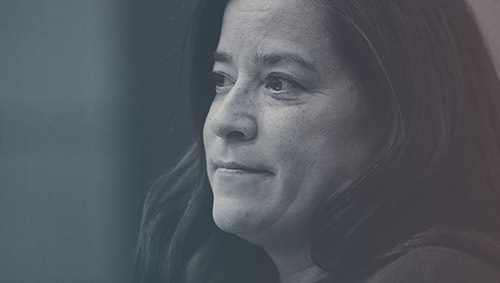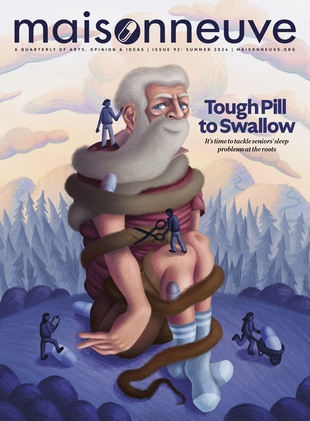
In the Weeds
Kaila Jefferd-Moore ignored the headlines about Jody Wilson-Raybould, she explains—they missed the point.
When I told my mom I was moving across the country to attend journalism school, she wasn’t thrilled I was going to be “a writer.” I understood. She wanted me to be successful and self-sufficient. But, I soon realized, she was finding new optimism by reaching back into her memory, re-examining what it means to be a journalist. When I published an article with Maclean’s, she called and said, “Maybe you’ll be the next Adrienne Clarkson.”
We share a habit of looking for women to admire, and we even look for similar qualities in them, like tenacity and resilience. I hadn’t followed Jody Wilson-Raybould’s work before 2015, but her election that year compelled me to start. When she was appointed justice minister and attorney general soon after, it was like an injection of confidence in all the vague talk about reconciliation. For a minute, we were hopeful; a Kwakwaka’wakw (We Wai Kai Nation) lawyer held one of the most important positions in the country. She was the first Indigenous person to hold the title.
I started learning more about her, digging into details most people still don’t care about. Before going into federal politics, Wilson-Raybould used her legal training at the BC Treaty Commission to help negotiate treaties. As a councillor for the We Wai Kai Nation, she guided it in moving out from underneath the suffocating Indian Act. As regional chief for the BC Assembly of First Nations, she helped create a three-part “Governance Toolkit” for other nations trying to do the same.
As I followed her career in Ottawa, I saw subtle signs that she continued this type of work with her new, huge influence. While she was its minister, the department of justice released the government’s new guidelines for building nation-to-nation relationships with individual First Nations, Métis and Inuit governments, echoing the BC toolkit. She continued to be known as Puglaas, her Kwak’wala name, meaning “woman born to noble people,” choosing to keep it as her Twitter handle.
I identified with Wilson-Raybould, an Indigenous woman working through institutions to elicit change. I was feeling the rawness of being an Indigenous woman working to succeed in my own career, trying not to lose sight of why I was there.
Sitting in mostly white Indigenous studies classes made me painfully aware of the pressure to know everything, to be the Native Spokesperson; it made me painfully aware that I knew all the answers about colonization, but just a sliver of Haida teachings and none of Xaad Kil, a Haida dialect. My peers learned about “Indigenous issues,” while I learned exactly how the government changed legislation that caused my family’s matriarch to “lose” her Indian status.
Attending university for a journalism degree is a privilege, I know, and I choose to use it by trying to include Indigenous voices and stories in Canadian media. And maybe—if I’m honest about my deepest wishes—to help alter the whole media institution from within.
It’s sacrilegious for journalists to reject daily news. But the SNC-Lavalin controversy made me hate the daily cycle. The headlines were unavoidable; they felt chaotic. Each day brought a new twist. Every second headline mentioned the Montreal-based engineering firm, Jody Wilson-Raybould or the prime minister. Everyone had something to say about it.
I stayed purposefully ignorant of the daily sensations—I already knew what was really happening, what was really important. There’s something about watching our prime minister throwing an Indigenous woman to the wolves that I’m not interested in.
We’ve seen something like it before. Two years ago the Liberal government announced it was backpedaling on one of its major campaign promises, electoral reform, and proceeded to let then-minister of democratic institutions, Maryam Monsef, become the face of the failure. The Liberals decided not to axe the voting system that got them into power, blaming it on a lack of support, and Monsef was made minister of status of women; that shuffle, like Wilson-Raybould’s, was seen as a demotion. Monsef was the scapegoat.
For any minister, going from attorney general to any other cabinet position would be considered a loss of power. But when this minister is Wilson-Raybould, it means more. It feels like a sign from the prime minister’s office to Indigenous voters that she has less importance to government than she once did, that the people she represents have less importance.
It felt like weeks had passed before I finally tuned in to the SNC-Lavalin affair, but it was only days. It was a video of Wilson-Raybould’s father that finally made me follow the trail of daily scraps the media had been throwing. Bill Wilson was speaking at a 1983 constitutional conference on Native issues.
It’s a grainy video, the kind that looks like it was filmed on a home videocassette recorder, but the sound is clear. Wilson is sitting in front of a microphone, casually telling a story to his audience, almost like an uncle telling a story around the kitchen table. He tells then-Prime Minister Pierre Trudeau that his two children aspire to become lawyers one day, and eventually prime minister. There are a few chuckles.
Is it funny that a child wants to be prime minister one day? Or is it funny because it’s a Native child’s dream? Then he says that the children sharing this big dream are little girls. The laughter is loud this time.
I felt myself sucked into the story, just like Bill Wilson’s daughter has been sucked in. I wonder about the path she took since the early eighties: when she told her father of her dreams, when she was called to the bar; even more, I’m compelled by the path she’s taken from then to now. When did the cracks begin to form for Wilson-Raybould? At what point did it feel like there was no turning back on the Liberals, even if the Liberals had turned their backs on her?
Indigenous women face so much pressure to succeed. We protect land and water, and we fight for missing and murdered Indigenous women and girls. Elders look to my generation and say we are the ones to change things. But youth also look to Wilson-Raybould’s generation and want to follow similar paths. Age aside, when there are so few Indigenous leaders featured in media, just one person can be burdened with standing for thousands.
I watched videos of reporters surrounding Wilson-Raybould for a media scrum and following her down the street, baiting her to throw them any morsel. We were all there filling the void—waiting for her to speak, clinging to any word she spoke or tweet she tweeted. It all overwhelmed me. It must overwhelm her; her sea of success tangled by the slick weeds of the government she’d championed.
So many people wanted her to speak, it almost made me wish she wouldn’t, just out of spite. She’s been called “the woman at the centre of it all” in the scandal. This is incorrect; SNC-Lavalin is the centre of its own scandal, and Wilson-Raybould’s been pulled into its orbit.
But she’s Puglaas—not “the woman at the centre of it all,” but a woman born to noble people. She’ll continue to wade through this wreckage her team has created with tact and integrity. I think I’ll keep ignoring most of the daily headlines. And I’ll continue to respect how she chooses to handle it.





